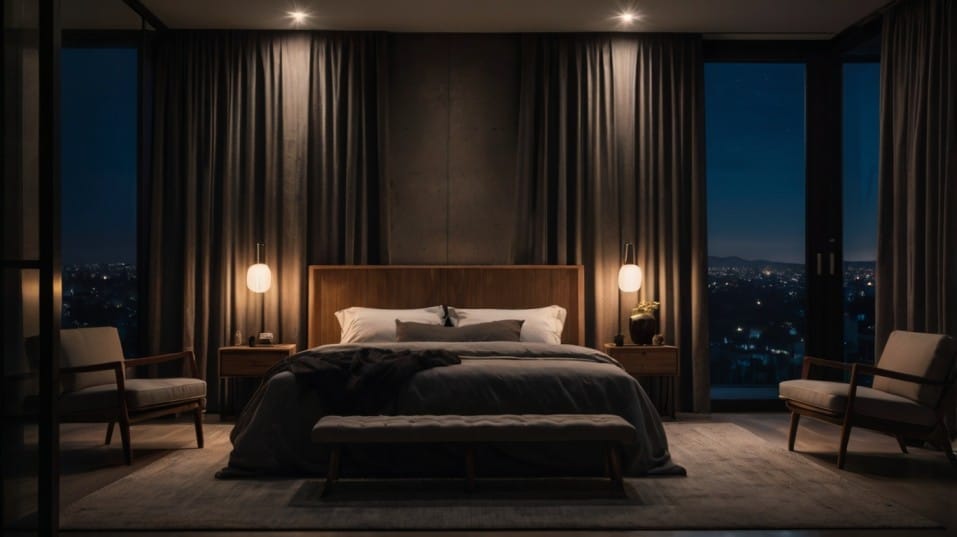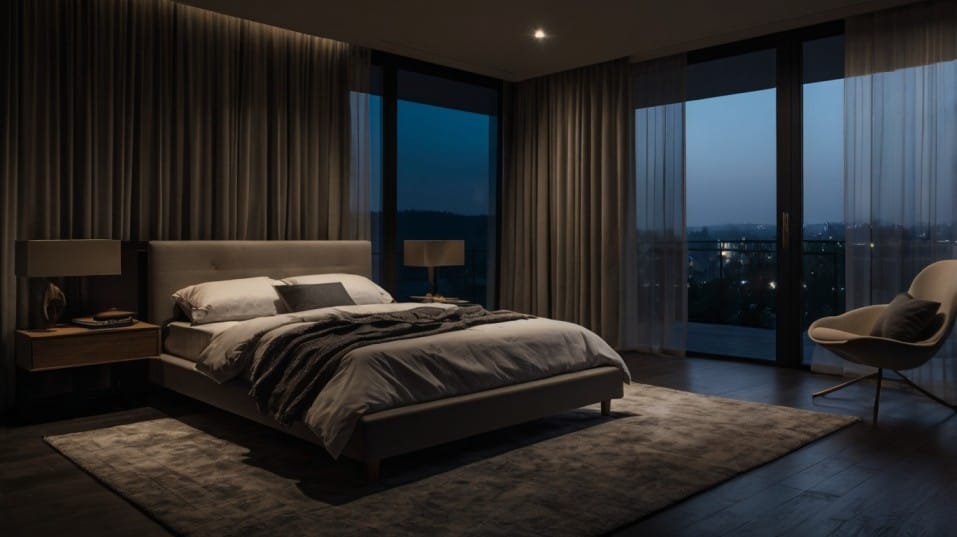The One Thing Your Bedroom Might Be Missing
Struggling with light, broken sleep? Discover how true darkness resets your brain, deepens rest, and upgrades your energy—starting tonight.

Ever wonder why your sleep still feels off—even when you’re doing everything “right”? You cut caffeine, avoid screens, maybe even pop melatonin. But the real fix could be hiding in plain sight: darkness.
Not just “lights off” darkness—total, blackout-level dark. This one simple shift helps your brain shut down faster, boosts recovery, and locks in real rest. If you want sleep that actually feels restorative, this is where you start.
Why Darkness Is a Non-Negotiable for Better Sleep
Your body has a built-in sleep command center called the suprachiasmatic nucleus (SCN)—think of it as your brain’s timekeeper.
This system regulates your circadian rhythm, the roughly 24-hour internal clock that controls your sleep-wake cycle. And it relies heavily on light as its primary input.
When darkness falls, your SCN cues the release of melatonin, the hormone that helps prepare your body for sleep. When light—especially blue or white light—hits your eyes, it disrupts this flow.
It doesn’t take much. A glowing power strip, a sliver of light through the curtains, the numbers on your alarm clock—these small signals are enough to tell your brain, stay alert.

This means your sleep isn’t just about how long you’re in bed—it’s about the quality of what happens while you’re there. Poor melatonin signaling leads to lighter, more fragmented sleep.
You don’t get enough time in the deeper stages of sleep—where tissue repair, immune support, and memory consolidation happen.
You wake up technically rested but still foggy. Still tired. Still chasing the feeling of actually being recharged.
What Real Darkness Looks (and Feels) Like
Here’s the test: at night, turn off all lights in your bedroom, stand in the center of the room, and wait 30 seconds. If you can still see shapes, outlines, or your own hand in front of your face—it’s too bright.
Total darkness isn’t an aesthetic. It’s a signal. True darkness tells your body, unambiguously: we're off the clock. But most bedrooms fail that test. Here’s where they go wrong—and how to fix them.
The Usual Suspects: Hidden Light Leaks
- Windows: Streetlights, headlights, or even a neighbor’s porch light can leak through curtains and disrupt your circadian rhythm. Thin blinds or sheer drapes won’t cut it. You need blackout curtains—preferably ones that extend past the edges of your window frame. If you rent, use spring-loaded curtain rods and stick-on Velcro strips to seal the sides.
- LEDs and Standby Lights: Your Wi-Fi router, phone charger, air purifier, and even your toothbrush base probably glow in the dark. These tiny lights can keep your brain slightly more alert than it should be. Solution? Blackout stickers, electrical tape, or better yet—just unplug or cover these devices completely.
- Digital Clocks: A bedside clock that glows red, green, or blue can sabotage your melatonin. If you need an alarm, opt for a device with a manual dimmer—or face it away from your bed and cover the display.
- Light Under Doors or From Hallways: Even a hallway nightlight can throw your brain out of sync. Install a door draft stopper or roll up a towel to block the glow from seeping in.
Sleep Masks: Your Secret Weapon (When Done Right)
If blackout curtains and full light control aren’t practical—or you just want an extra layer of protection—a high-quality sleep mask can be a game-changer.
Look for a contoured mask that blocks all light but doesn’t press into your eyes. The goal is zero gaps, zero pressure, and total darkness.
Skip the flimsy satin ones that come with travel kits. You want something designed for actual overnight use—lightweight but structured, breathable but firm.
Added bonus: putting on a sleep mask becomes a mental cue that sleep is starting. Over time, it becomes a ritual—your brain learns that mask = sleep time, and starts to power down even faster.
The Role of Light Before Bed
Getting rid of light while you sleep is step one. But you also need to prime your body for darkness before you hit the pillow.
Two hours before bed, start dimming your lights gradually. Avoid bright overhead lighting. Use floor lamps or wall sconces with warm, low-intensity bulbs.
Swap out cold LED lights for warmer, amber-toned lighting. If you’re on screens (we get it), use blue-light filters—or at the very least, dial the brightness way down.
This isn’t about perfection—it’s about consistency. Dimming the environment teaches your body that it’s time to shift gears.
Melatonin starts to rise, your heart rate lowers, your nervous system relaxes. When you finally slip into bed, you’re not trying to sleep—you’re already halfway there.
Daily Benefits You’ll Actually Notice
What do you get from sleeping in real darkness?
- Stronger recovery: Growth hormone and muscle repair peak during deep sleep.
- Better energy: No more groggy, half-asleep mornings.
- Sharper focus: Deep sleep improves memory and cognitive processing.
- Fewer wakeups: You’re less likely to stir at night when your environment stays consistent and light-free.
- More stable mood: Consistent sleep patterns support dopamine and serotonin regulation.
This is how you stop “trying to sleep better” and actually feel the results—without needing supplements, sleep trackers, or elaborate routines.
Final Thoughts: Black It Out, Sleep It Off
Your bedroom isn’t a lounge. It’s a performance space—where your body recovers, resets, and prepares for the next day. If there’s light sneaking in, even a little, you’re sending mixed signals to the one system that controls your sleep cycle.
Fixing that doesn’t take much. A pair of blackout curtains, some tape over LEDs, and a solid sleep mask can transform your bedroom from just dark enough to deep-sleep optimized.
Want better sleep? Start with darkness. Tonight, give your brain what it’s really waiting for: lights out, zero glow, total reset. Sleep deeper. Wake sharper. Live better. Kill the light. Reclaim your sleep. Start now.




